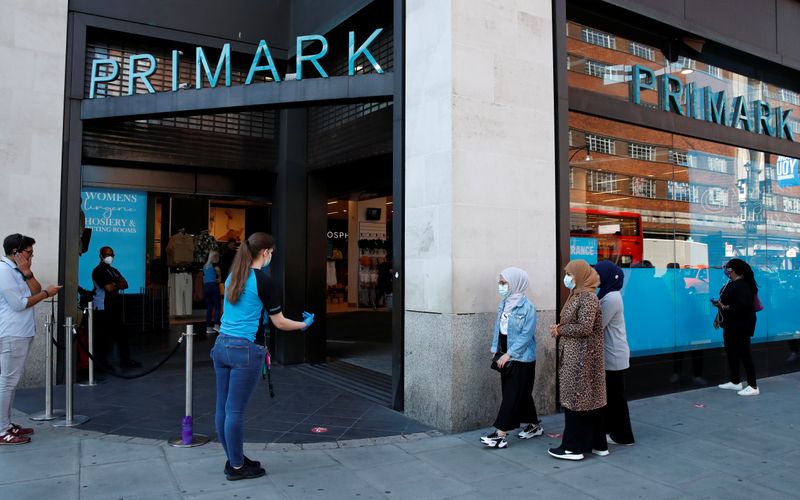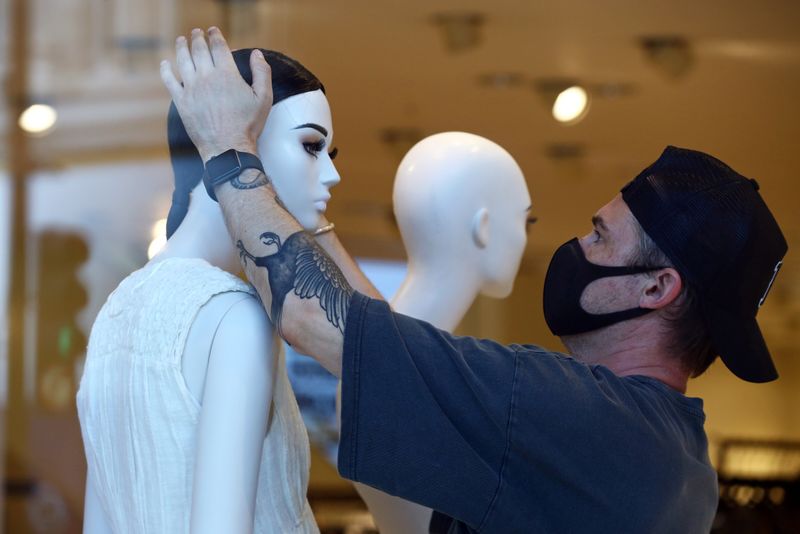By James Davey
LONDON (Reuters) - Long queues of shoppers snaked around stores in England on Monday, with discount fashion retailer Primark proving a particular draw as shops reopened their doors after 83 days of lockdown.
Queues formed from early morning outside several branches of Primark, which does not sell online so has not made a penny in the UK for months.
The chain reopened some of its stores early, including its biggest in Birmingham, to avoid overcrowding as hundreds of people lined up outside. At its Leeds store, the estimated afternoon wait time to get in was up to an hour.
There was also a big queue outside the Nike (NYSE:NKE) Town store on London's Oxford Street, the capital's busiest shopping street, with many shoppers ignoring social distancing rules.
Department stores, clothing retailers, electrical outlets, bookshops and other non-essential stores have been closed since March 23 when Prime Minister Boris Johnson imposed a lockdown to limit the spread of the coronavirus.
The reopening only applies to England, with stores in Scotland and Wales waiting for guidance from their devolved administrations on when they can resume trading. Non-essential stores in Northern Ireland reopened on Friday.
The UK government is encouraging people to go out and spend to help boost the economy, which shrank by a quarter over March and April.
The British Retail Consortium reckons the lockdown has cost non-food stores 1.8 billion pounds ($2.3 billion) a week in lost revenues.
"The government's priorities have always been lives first, but clearly restoring livelihoods, protecting jobs, making sure our economy can motor and recover again is really important," business minister Paul Scully told Sky News.
STORES LOOKING DIFFERENT
Retail footfall across England's retail destinations had increased by 41.7% up to 1100 GMT in comparison to last Monday, researcher Springboard said.
Stores look very different, though, as they must observe social distancing regulations. As well as having to queue outside as numbers inside are restricted, shoppers are greeted with hand sanitisers and there are limits on touching and trying out products.
Some chains are reopening all their English stores, while others are taking a phased approach.
Primark, owned by Associated British Foods (L:ABF), reopened all its 153 stores, while Marks & Spencer (L:MKS), which has traded online and kept its food halls open, reopened the majority of its clothing space.
Rival Next (L:NXT) reopened 64 stores, having already reopened 64 homeware stores during the lockdown. John Lewis [JLPLC.UL] reopened just two outlets.
Many small independent stores, where it is difficult to implement safe social distancing practices, remained closed.
Sofie Willmott, an analyst at GlobalData, said that while the queues on high streets might look promising for retailers, there were tough times ahead.

"Footfall and spending will take a long time to return to pre-COVID levels," she added.
